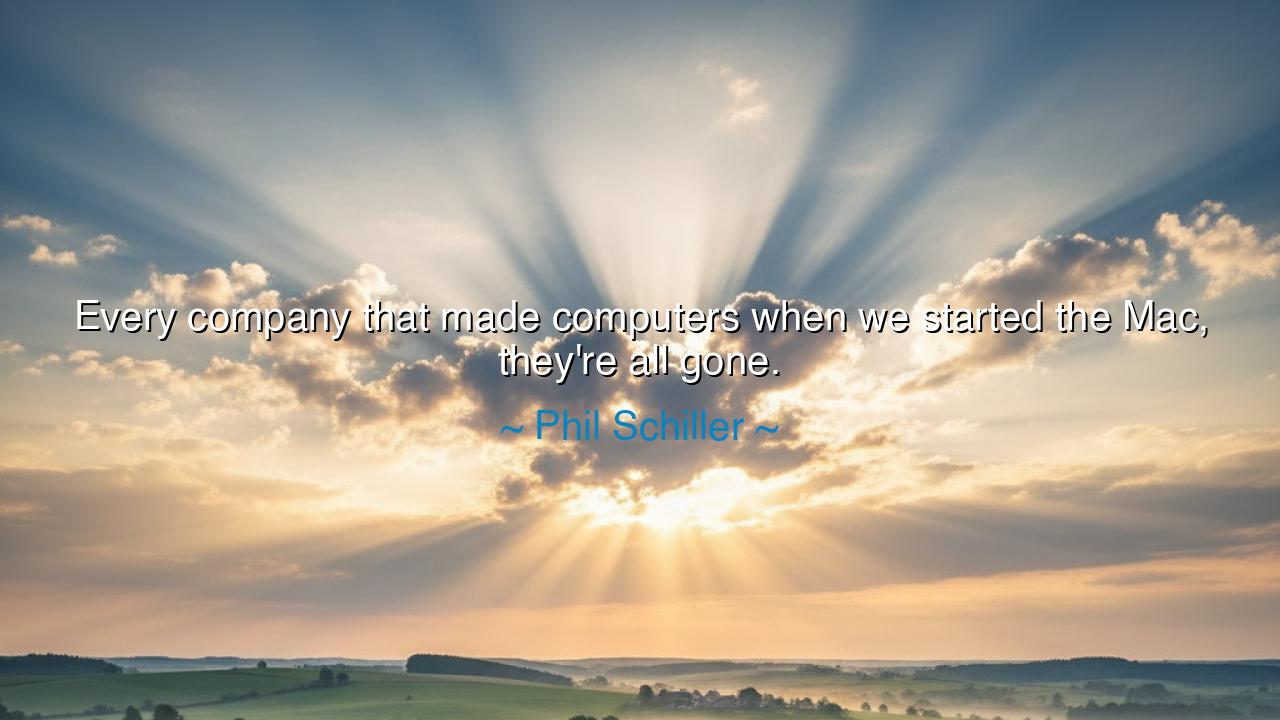
Every company that made computers when we started the Mac






The modern herald of innovation, Phil Schiller, once declared with both pride and solemnity: “Every company that made computers when we started the Mac, they’re all gone.” In this brief but thunderous reflection, he speaks not only of the triumph of Apple, but of the impermanence of empires, the relentless march of change, and the rare endurance of those who dare to dream differently. His words echo like a bell across the ages — a reminder that creation demands courage, and that in the shifting sands of time, only vision rooted in truth and renewal can endure.
When Schiller speaks of the Mac, he speaks not merely of a machine, but of a revolution — a moment when human imagination reached beyond the known boundaries of technology and sought to give form to the future. In the dawn of the digital age, countless companies stood proud, crafting computers that filled rooms and defined industries. They seemed invincible, their names carried like banners across the landscape of innovation. Yet as the years turned, they fell one by one — Commodore, Atari, IBM’s home computer line, and so many others. They were giants, but giants who could not change fast enough. Apple, by contrast, endured not through size or dominance, but through vision — through its faith in beauty, simplicity, and the marriage of human and machine.
This truth is as ancient as civilization itself. When the Roman Empire ruled the known world, it too seemed eternal. Its legions marched beneath the eagles of conquest; its cities gleamed with marble and gold. Yet even Rome, mighty as it was, fell — not from weakness alone, but from the slow decay that comes when innovation fades and complacency takes root. So too with the companies Schiller speaks of: their fall was not sudden, but the result of failing to adapt, to dream anew, to see beyond the moment. In the world of technology, as in the rise and fall of nations, survival belongs not to the strongest, but to the most visionary.
When Schiller says, “They’re all gone,” it is not a boast of conquest, but a meditation on the price of progress. The path of innovation is strewn with the ruins of the past — proud creators whose inventions once shaped the world, now reduced to memory. Yet their passing is not tragedy, but transformation. For every fallen company has left behind fragments of knowledge, tools, and ideas that became the foundation for what came next. Just as the libraries of Alexandria burned but their spirit lived on in the scholars of the Renaissance, so too did the spirit of those early inventors live on in the glowing screen of the Macintosh. In this way, Schiller’s words remind us that even loss can serve the birth of new creation.
The origin of this quote lies in Apple’s long struggle against oblivion. In its early years, Apple was not the towering force we know today. The company faced collapse, betrayal, and exile — even Steve Jobs, its visionary founder, was cast out for a time. Yet through these trials, a deeper strength was forged: the understanding that survival in a world of constant change requires not arrogance, but reinvention. When Jobs returned to Apple, he and his team, including Schiller, breathed new life into the company. They did not seek to imitate the world around them — they sought to redefine it. And in doing so, they became what others could not: timeless in a field defined by obsolescence.
Consider, too, how this truth has echoed through the ages. The artists of the Renaissance, the scientists of the Enlightenment, the engineers of the Industrial Age — all who transformed their world faced the same challenge: to create something that would outlast their contemporaries. Their success was not measured by their number or wealth, but by the depth of their vision. Leonardo da Vinci sketched machines centuries ahead of his time; Newton saw the invisible laws that bound the cosmos; Apple, in its own way, sought to bring art into the world of machines. All these creators share a lineage — the courage to imagine differently, to stand where others fall, to endure where others fade.
From Schiller’s reflection, a powerful lesson arises for all who build, dream, or lead: nothing lasts by inertia. The moment one ceases to evolve, one begins to vanish. Whether in business, art, or the course of life itself, survival demands renewal, curiosity, and courage. The names of the fallen may fade, but their warning remains eternal: do not mistake success for permanence. The river of time spares no stillness; only those who flow with its current endure.
So let this wisdom be passed down: innovation is not a single act, but a lifelong discipline. Build not only to succeed, but to inspire. Question not only what is possible, but what is meaningful. For as Phil Schiller reminds us, even the greatest names can vanish — but those who create with purpose, who merge technology with the human spirit, carve their mark into eternity. The companies may fall, the machines may rust, but vision, once born, is indestructible.






AAdministratorAdministrator
Welcome, honored guests. Please leave a comment, we will respond soon